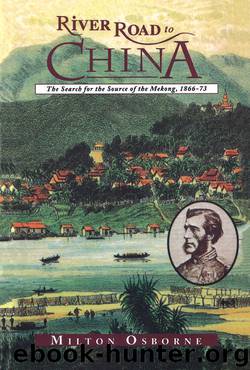River Road to China by Milton Osborne

Author:Milton Osborne [Osborne, Milton]
Language: eng
Format: epub
ISBN: 9780802196088
Publisher: Grove Atlantic
Published: 0101-01-01T00:00:00+00:00
CHAPTER VIII
ACROSS THE RED RIVER
The explorers were in China but, as they soon realized, in a very special region of that varied empire. Here, at the southern fringe of imperial territory, they found the “routine uniformity” of Chinese civilization and the continuing presence of minority tribes and peoples whose language and culture were linked to the jumbled ethnic groups of northern Burma, Laos, and Vietnam. The province of Yunnan, where they now rested, had become part of China as long ago as the thirteenth century, under the Mongol dynasty. In the succeeding centuries, however, its distance from northern China and the varied character of the region's population had brought it long periods of semi-independence.
By the middle of the nineteenth century, less than twenty years before the French party came in such sorry state to Ssu-mao, one group among Yunnan's ethnically diverse population was smoldering with resentment. This was the Islamic minority. Its members were the descendants of rough-riding Central Asian soldiers who had streamed out of the distant steppes to fight as mercenaries for Kublai Khan. Despite their martial antecedents these followers of Islam were not accorded a military role by the succeeding Chinese dynasties, who distrusted the former servants of the Mongol barbarians. By the mid-nineteenth century they were the victims of widespread discrimination. In 1855, with two remarkable charismatic leaders, Ma Te-hsing and Tu Wen-hsiu, at their head, the Muslims rose against imperial authority. As Lagrée and his men considered their present position and their future, the Islamic revolt was twelve years old, and the rebels controlled most of western Yunnan. The explorers had to decide how this situation would affect their plans.
More than ever before, the difficulty of decision was clear to Lagrée himself and to his subordinates, and with indecision there was the risk of dissent and disagreement. For Lagrée the value of exploring the Mekong to its source now seemed less important than making a commercial reconnaissance of southwestern China; to know more of the Mekong's origins was scientifically desirable but probably practically impossible. Garnier saw matters in a different light. His obsession with the Mekong had not abated; for France, and for himself, there could be glory and genuine scientific achievement in tracing the great river to its source, even if hopes for the Mekong as a navigable waterway had been illusory.
Lagrée's choices would have been easier if the information available to the expedition had been less fragmentary. One further major error in planning was now apparent. The party had no truly satisfactory way of communicating with the Chinese officials upon whom they had to rely for advice. Prince Kung's letter produced a readiness to provide assistance, but it could not overcome the lack of a common language. Alévy proved unable to exchange more than the briefest words with the officials they met in Ssu-mao, and another youth brought from the regions near Keng Hung in the express hope that he would be able to aid the Frenchmen in understanding the officials of Yunnan was scarcely better.
Download
This site does not store any files on its server. We only index and link to content provided by other sites. Please contact the content providers to delete copyright contents if any and email us, we'll remove relevant links or contents immediately.
East of Eden by John Steinbeck(3211)
A Forest Journey by John Perlin(3071)
Atlas Obscura by Joshua Foer(2956)
Merriam-Webster's Collegiate Thesaurus, Second Edition by Merriam-Webster Inc(2755)
Tokyo by Rob Goss(2428)
Stone Building by Kevin Gardner(2394)
Futebol by Alex Bellos(2357)
A History of Warfare by John Keegan(2240)
Top 10 Dubai and Abu Dhabi by DK Travel(2100)
Lonely Planet Australia by Lonely Planet(2080)
Discover Australia by Lonely Planet(1946)
Beyond the Coral Sea by Michael Moran(1912)
Lonely Planet's Guide to Travel Photography by Lonely Planet(1869)
Rick Steves London 2018 by Rick Steves & Gene Openshaw(1869)
Lonely Planet Maldives (Travel Guide) by Planet Lonely & Masters Tom(1850)
Deep South by Paul Theroux(1834)
Blue Highways by William Least Heat-Moon(1774)
Lonely Planet Guatemala by Lonely Planet(1752)
Borneo Travel Guide by Lonely Planet(1724)
